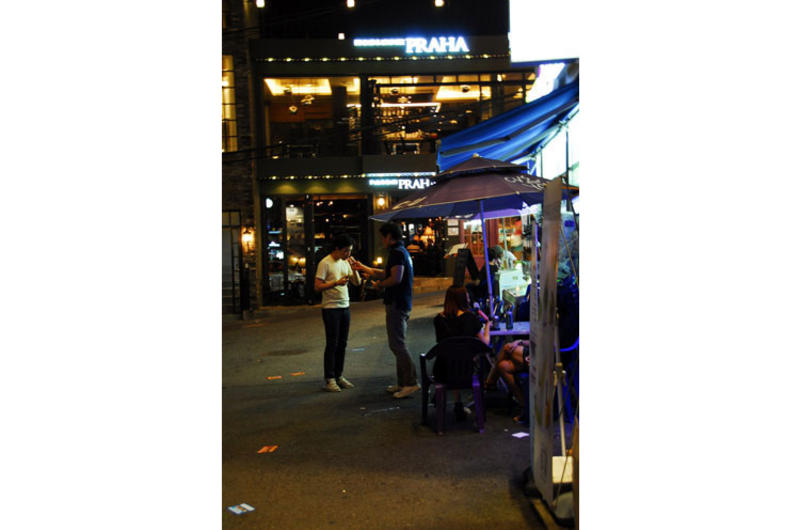US military to continue patrols in Itaewon, but other party areas in Seoul remain unmonitored

Few U.S. troops were seen in Itaewon shortly before midnight on Aug. 8. Itaewon area businesses have complained that the curfew and U.S. military patrols driving servicemembers to other areas of the city where they will can go unmonitored by the patrols. (ASHLEY ROWLAND/STARS AND STRIPES)
By ASHLEY ROWLAND AND YOO KYONG CHANG | Stars and Stripes August 10, 2013
SEOUL, South Korea — Even an agreement can spawn disagreement when it comes to the Korean nightlife businesses that rely on American troops for a sizeable portion of their income.
Businesses in Itaewon — the entertainment district adjacent to Yongsan Garrison that once teemed with troops — have renewed an agreement with the military that is aimed at curtailing servicemembers’ misbehavior and ensuring their safety, but merchants still want a years-long nightly curfew ended and military patrols to be less visible.
The renewal of the agreement comes in the wake of recent protests outside Osan Air Base, 30 miles south of Seoul, by “juicy bar” owners who were unhappy about off-limits designations imposed by the base leadership amid allegations of human trafficking.
Juicy bars cluster by the dozens outside some U.S. military installations in South Korea. They primarily employ Philippine women as hostesses, whose job is to flirt with servicemembers and try to get them to buy the women expensive juice drinks in exchange for their continued company and conversation.
Yongsan says its July 24 agreement with Itaewon bar owners had been in the works for months and had nothing to do with the June protests outside Osan.
And while the head of a group representing Itaewon businesses says members are generally satisfied with the agreement, they have a number of complaints about how the military monitors Itaewon.
“We want to have more USFK servicemembers in Itaewon, but they hate the MPs [military police] and (courtesy patrols), so they are going to Gangnam and Hongdae [districts] instead,” said Yoo Wonsoon, president of the Itaewon Bar Owners’ Association, which includes more than 150 bars, restaurants and clubs in the popular entertainment district.
“If they are going to Hongdae or Gangnam, they can’t be safe because there are no MPs patrolling (there),” he added.
The four-page memorandum of understanding signed last month by Yoo and the U.S. Army Garrison Yongsan commander, Col. Michael Masley, is essentially an extension of previous agreements that allow military police and Command Presence Patrols — more commonly known as courtesy patrols — to monitor the popular Itaewon entertainment district.
The agreement is “meant to promote mutual understanding and cooperation” between the two groups. While not legally binding, it states that businesses that do not meet force protection and health and safety standards may be placed off-limits by Yongsan’s Armed Forces Disciplinary Control Board.
Dennis Pugh, civilian misconduct officer for the Yongsan Directorate of Emergency Services, said the agreements are typically updated whenever a new commander assumes leadership at Yongsan; Masley assumed command in August 2012. Yongsan proposed renewing the agreement earlier this year but it was not signed until July due to scheduling conflicts, Pugh said in a statement to Stars and Stripes.
The renewal of the agreement was not prompted by any specific incidents of misconduct, he said, but is “a tool to help prevent acts of misconduct.” While the agreement does not mention specific steps businesses are asked to take, Pugh said members are asked to check the age of customers who purchase alcohol to prevent underage drinking, to stop serving intoxicated customers and to notify them as USFK’s 1 a.m. to 5 a.m. curfew approaches.
That curfew — along with the military’s perceived quickness to declare some businesses off-limits — remains a thorn in the side of Itaewon merchants, who believe those policies are driving away potential military customers.
While Itaewon remains a popular spot for troops to shop, eat and drink, the area once frequented almost exclusively by the U.S. military has, in recent years, become a trendy area for young Koreans and expatriate teachers who come to Seoul to teach English for a year or two. On weekend nights, more Koreans than GIs can be found in Itaewon’s increasingly upscale restaurants and bars.
And despite the military’s focus on monitoring Itaewon, the university area of Hongdae and swanky Gangnam remain popular with the military. A nighttime curfew for the military was put in place for Hongdae in 2007 after a servicemember raped a 67-year-old woman, but has since been lifted.
Two soldiers were fined for attacking South Korean police officers and destroying property in separate incidents in Hongdae over the St. Patrick’s Day weekend this year.
Another soldier was convicted last year of raping a 17-year-old South Korean girl in September 2011 after meeting her in a Gangnam dance club and then raping her at her home — a crime that contributed to enactment of the current curfew.
The garrison does not conduct MP or courtesy patrols outside of Itaewon, and is not considering starting patrols in other areas, spokesman Mark Abueg said. The garrison also does not have agreements similar to the one signed with the IBOA with other organizations.
Yongsan did not specifically address Yoo’s claim that the MP and courtesy patrols are driving troops out of Itaewon to areas that go unmonitored by the military, but said in a statement that the purpose of both is to “help maintain good order and discipline.”
Yoo said that Itaewon businesses have also asked that only one or two courtesy patrol members or MPs enter a business during routine checks, instead of larger groups of seven or eight personnel.
Pugh said the garrison has agreed that when appropriate, only two MPs — along with a single Korean police officer — will enter establishments during those checks.



